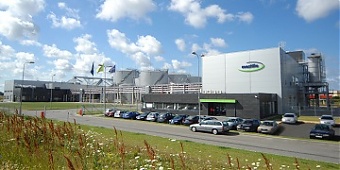Ecology, Energy, Good for Business, Industry, Investments, Lithuania, Markets and Companies, Transport
International Internet Magazine. Baltic States news & analytics
Saturday, 28.02.2026, 01:50
Mestilla invests 6M EUR in used cooking oil processing project in Klaipeda
 Print version
Print version |
|---|
In May, Mestilla started
working towards accrediting an environmental impact evaluation with the goal of
completing an expansion project involving used cooking oil processing and
biodiesel production in their plant found in the territory of the Klaipeda FEZ,
at Kretainio st. 5. The construction of new premises is expected to start in
the beginning of 2021, with the production starting in the last quarter of the
same year.
According to Arunas Zubas,
CEO of Mestilla, the company which has been using rapeseed oil in its biofuel
production since 2007, is planning to use a new material -- used cooking oil
that can be a problem for restaurants and sewage treatment plants.
“Used vegetable oil is a left
over after frying or processing food in other ways,” said A. Zubas. “This waste
cannot be spilled down the drain because oil is difficult to treat at waste
management plants. The European Commission, as well as the Republic of
Lithuania, strongly encourages the repurposing of this waste, the production of
modern biofuel, and the circular economy, so processing this used oil to
biodiesel, which will later be mixed with mineral fuel, will allow us to
contribute to a cleaner and safer environment and reducing Lithuania’s
dependency on fossil fuel.”
In 2019, the European
Commission (EC) put forth a new Renewable Energy Directive (RED II), which
aspires to increase biofuel usage to 14% in transportation by 2030. Until now,
European countries aspired to the goal of a 10% share by 2020. The EC aims for
7% of first-generation biofuels in the total portfolio and the remaining 7% of “advanced”
biofuel from used cooking oil and other waste, second-generation biofuel and
electricity from renewable sources. The EC calculates that first-generation
biofuel reduces CO2 emissions by 60%, while used cooking oil biofuel reduces emissions
by 90%. Also, according to the European Commission, all biofuel strengthens
local and rural region economies and reduce dependency on imported energy
sources.
Mestilla expects to process
up to 40,000 tonnes of used oil per year, which would account for 15% of the
company’s total processing capacity, once the expansion project is complete.
With the help of various partners, Mestilla plans to collect oil from
Lithuanian food sector companies, which will allow them to not only save but
make money as well.
Eimantas Kiudulas, CEO of
the Klaipeda FEZ, comments that the new project from Mestilla entirely fits in
with the European and worldwide trend of investment in circular economy
projects. With the pre-existing circular economy experience at various
companies and the specialization of the Klaipeda University, the city can
become the leader of bioeconomy sector in the Baltics.
“The European Union
countries emphasize the necessity of recycling waste as many times as possible
instead of discarding it,” said E. Kiudulas. “Most of the plastics companies at
the Klaipeda FEZ contribute to this effort in a major way, the oil project by
Mestilla will bring even more circular economy knowledge and practical
experience.”
Mestilla oil refining process
will take place in closed containers, pipes, and reactors, without interaction
with environmental air. The project will be developed in the current Mestilla
premises, containers for raw materials and end-products will need to be built.
Mestilla expects to invest 6-7 million EUR into the project, creating six new
job vacancies. Similar used vegetable oil recycling refineries are being
operated by companies like Green Energy Biofuels (Amsterdam, the Netherlands),
EcoMotion (Losning, Denmark; Montmelo, Spain; Lunen, Germany) and Argent Energy
(Motherwell, the UK).
“We are taking the impact
of our activity and the well-being of the Klaipeda region very seriously,” said
A. Zubas. “Ignoring running costs, we have invested 0.5 mln EUR in odor
reduction technologies and solutions. Today, the odor concentration in the
closest residential district to our factory is at least five times smaller than
the new standard, which will come into effect in 2024.”
According to odor
measurements and spread modeling in unfavorable meteorological conditions,
which were performed in 2018, the biggest odor concentration at the edge of the
company’s territory is 5.2 OUE/m3 and 0.6 - 1 OUE/m3 by the nearest residential
districts. Currently, the odor concentration threshold in residential
neighborhoods is 8 OUE/m3, which will be reduced to 5 OUE/m3 in 2024.
In May, Mestilla completed
another odor neutralization project, where Airborne 10, a material made to
neutralize residual odors, is injected into the air stream post-production.
20,000 EUR were invested in the project, minus operating costs. This project
expanded the odor neutralization process at Mestilla to three stages:
neutralization via water and alkaline solution, ozonation of the air stream,
and Airborne 10 injection.
- 28.01.2022 BONO aims at a billion!
- 26.08.2021 LLC Dizozols Investments finalizes investment attraction deal with Crowdestor with record-high profits
- 13.02.2021 Моя жизнь в газете. Очерки по новейшей истории Латвии. Глава 1
- 30.12.2020 Накануне 25-летия Балтийский курс/The Baltic Course уходит с рынка деловых СМИ
- 30.12.2020 On the verge of its 25th anniversary, The Baltic Course leaves business media market
- 30.12.2020 Business Education Plus предлагает анонсы бизнес-обучений в январе-феврале 2021 года
- 30.12.2020 EU to buy additional 100 mln doses of coronavirus vaccine
- 30.12.2020 ЕС закупит 100 млн. дополнительных доз вакцины Biontech и Pfizer
- 29.12.2020 В Латвии вводят комендантский час, ЧС продлена до 7 февраля
- 29.12.2020 Latvia to impose curfew, state of emergency to be extended until February 7








 «The Baltic Course» Is Sold and Stays in Business!
«The Baltic Course» Is Sold and Stays in Business!

